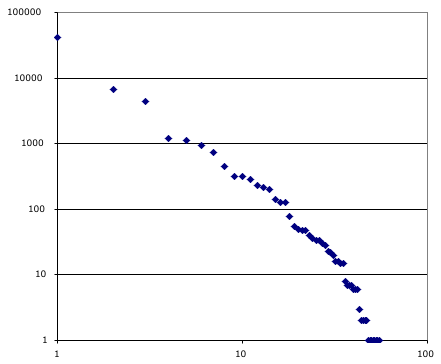 The chart at right has a dot for each open source license used by a project at source forge. Note this is projects, not installed base. I am not aware of good data for installed base. A typical power-law distribution.
The chart at right has a dot for each open source license used by a project at source forge. Note this is projects, not installed base. I am not aware of good data for installed base. A typical power-law distribution.
All the usual forces are in play that would lead toward that. Preferential attachment for example means that licensing choice is can be modeled as nothing more than mimicry of the current license distribution. Then there is the multiplicative process where new projects evolve out of the substrate of old projects, tending to bring along their own licenses. Finally there is a certain amount of condensation where projects find it advantageous to adopt similar or identical licenses for functional reasons, e.g. the lawyering to figure out if license #12 is compatible with license #17 is enough to drive most reasonable men insane.
While those forces are far more determinative in driving this distribution than the functional distinctions between the licenses once the distribution emerges the distinctions between leading licenses become clear because that’s what you have to lawyer out. Like the distribution of human languages the installed base tends to be very hard to migrate; short of disruptive displacement of entire cultures.
It saddens me. Not that we have all this diversity, that’s to be expected. What saddens me is that we, the open source community, seem to get fixated on hair splitting about the distinctions between these licenses.
These licenses are a very high risk experiment. They are an attempt to find a means to create a durible vibrant commons. Something that will stand the test of time. Something that will be useful to everybody. While we have a lot of very smart people working on finding a solution to this problem we won’t know if we found it until much much latter in the game. In games with lots of risk and little certainty diversity is an very good thing.
It is a bad idea to put all our eggs in one basket. Oh sure, too much diversity would be a pain both in mounting out defenses well and in the cost of tedious lawyering about capability. But! I deeply wish we would all try a bit harder to respect and admire the choices that each license community is making as they run their experiment. People should back off on being some damn certain they have the future by the balls. I fully expect that over the years some of these models are going to turn out to be impossible to defend from those who would privatize the commons.
We are all on the same side here, right?
I’m not sure where is the link supposed to point, but it is pointing back to your home currently.
Very interesting data. It goes along the lines that I read some time ago that most (if not all) power law distributions are rooted in sublying Markov Chains (aka Drunkyar’s walk). Clustering around a semi-random first choice, for instance, explains why I use Mandrake as my linux distribution in my X86 boxes, and also why I chose Gentoo (first working LiveCD I managed to find) for my TiBook.
Knowing the first few players would be great, too.
Thanks, fixed the broken link.
If your feeling math-e you can read this http://www.ececs.uc.edu/~annexste/Courses/cs690/Zipf,%20Power-law,%20Pareto%20-%20a%20ranking%20tutorial.htm which outlines when (and when not)
an iterative random processes draws the distribution of the prior round round tend toward power-laws.
Pingback: Ascription is an Anathema to any Enthusiasm » Blog Archive » Upgrade your Open Source License, Cash back on your cell phone bill!
Pingback: Ascription is an Anathema to any Enthusiasm » Blog Archive » In Praise of Tweaking
Pingback: Ascription is an Anathema to any Enthusiasm » Blog Archive » Building Houses on Sand